The Role of Personalized TPN Solutions in Optimizing Outcomes
Understanding the Impact of Personalization in Total Parenteral Nutrition (TPN)
Total Parenteral Nutrition (TPN) plays a critical role in supporting patients who cannot meet their nutritional needs through traditional oral or enteral intake. Recent advances emphasize personalized approaches, leveraging technology and interdisciplinary collaboration to refine therapy outcomes. This article explores how tailored TPN solutions enhance clinical effectiveness, reduce errors, and align with current healthcare standards, especially within neonatal and complex patient populations.
The Core Purpose of TPN in Patient Care
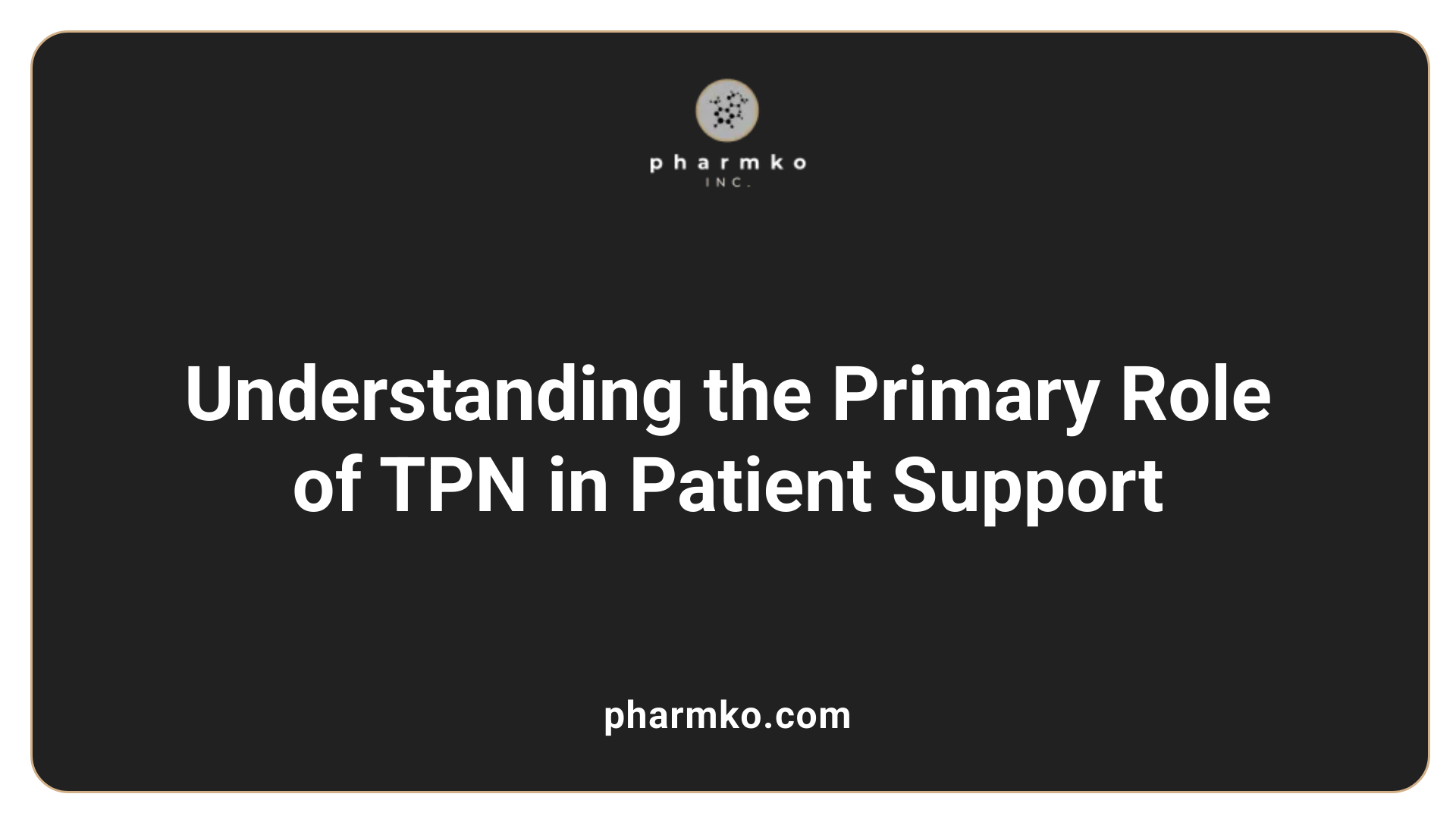
What is the primary purpose of total parenteral nutrition (TPN)?
Total parenteral nutrition (TPN) serves as a crucial nutritional intervention for patients who cannot receive sufficient nutrients through conventional oral or enteral routes. Its main goal is to deliver essential nutrients directly into the bloodstream, including proteins in the form of amino acids, carbohydrates like dextrose, fats, vitamins, and minerals.
This method aims to prevent and treat nutritional deficiencies, support tissue growth and repair, and maintain a stable metabolic state. TPN is especially vital for patients with compromised gastrointestinal (GI) functionality due to conditions such as surgeries, GI disorders, or severe illnesses.
In critical care settings, TPN helps meet increased metabolic demands and supports immune function. It provides a controlled nutrient supply that aids in recovery, reduces the risk of malnutrition, and stabilizes metabolic parameters.
In summary, the primary purpose of TPN is to sustain nutritional health and promote healing when oral or enteral feeding is not feasible, thereby supporting overall patient outcomes.
More Information Search Queries:
- Role of TPN in patient nutrition
- Clinical guidelines for TPN use
Personalized TPN Versus Other Nutritional Support Modalities
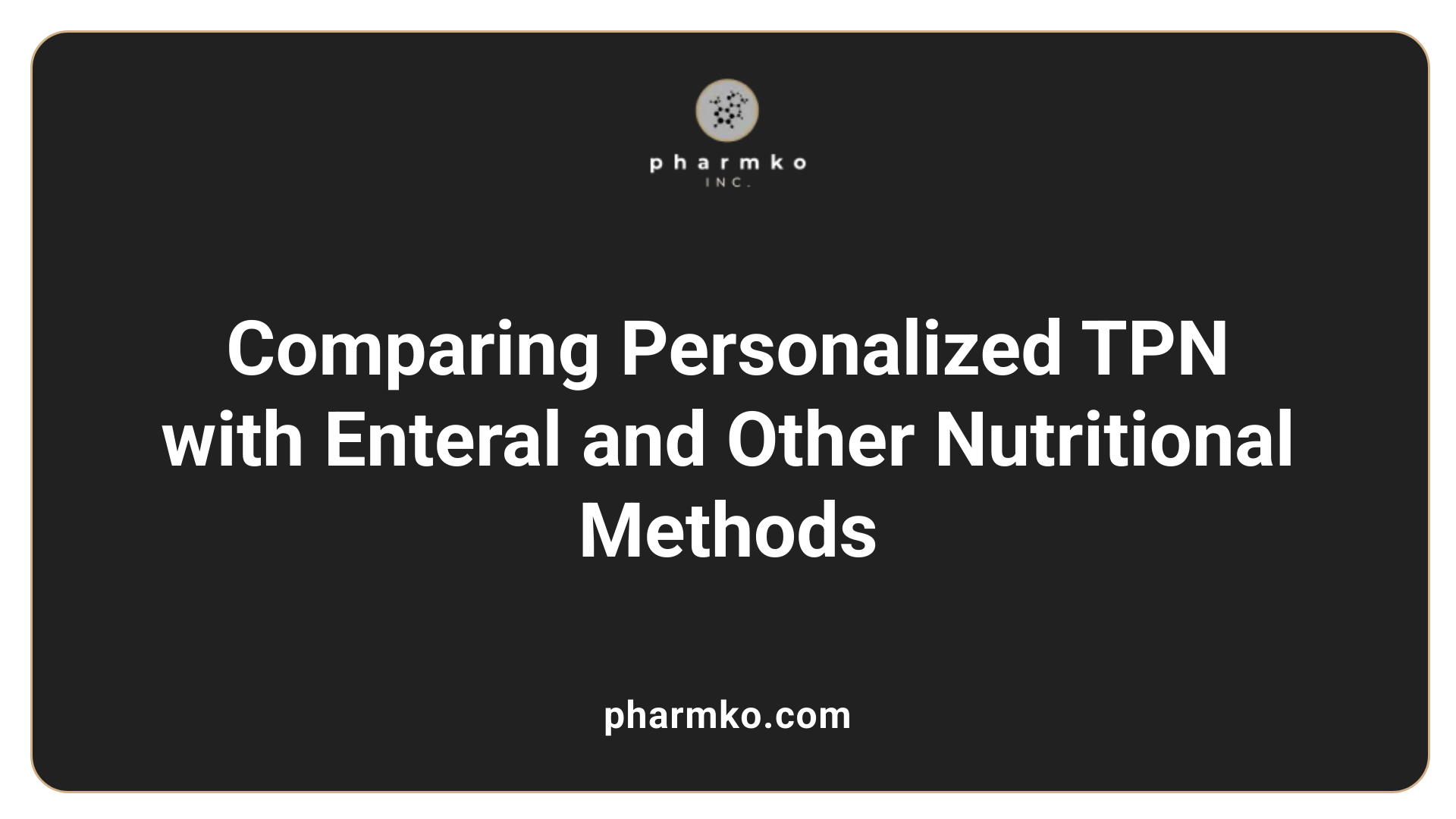
How does personalized TPN compare with other nutritional support methods such as tube feeding?
Personalized TPN (Total Parenteral Nutrition) offers tailored nutritional support by delivering essential nutrients directly into the bloodstream, effectively bypassing the digestive system. This approach is especially useful for patients with non-functional or severely compromised gastrointestinal (GI) tracts. For example, in cases of bowel obstruction, short bowel syndrome, or severe malabsorption, TPN becomes the preferred method.
In contrast, enteral feeding, or tube feeding, delivers nutrients directly into the stomach or small intestine when the GI tract is functional. It is generally less invasive and less costly than TPN and carries a lower risk of complications such as infections or bloodstream sepsis.
Advantages of TPN include precise control over nutrient composition and delivery time, making it highly customizable for specific patient needs. However, this method involves inserting a central venous catheter, which increases the risk of infections, bloodstream infections, and metabolic complications.
Tube feeding is easier to administer, usually requires less intensive monitoring, and is associated with fewer infections. Nonetheless, it is limited to patients with at least some GI function and can cause issues such as aspiration pneumonia, gastrointestinal discomfort, or clogging of feeding tubes.
Choosing between personalized TPN and enteral nutrition depends largely on the patient's condition. If the GI tract is intact and functional, enteral feeding is preferred for its safety and cost-effectiveness. When the GI system cannot meet nutritional needs, TPN becomes vital.
In summary, personalized TPN provides a highly targeted nutrition strategy suitable for specific clinical situations, while enteral feeding remains the first-line approach when feasible due to its safety profile and ease of use.
Personalized TPN's Significance in Modern Healthcare
Why is personalized TPN significant in health management and clinical practice guidelines?
Personalized Total Parenteral Nutrition (TPN) plays a vital role in contemporary healthcare by offering nutrient formulations tailored to each patient's unique needs. This individualized approach ensures that patients receive the precise balance of nutrients—such as amino acids, electrolytes, and glucose—optimized for their specific condition, age, and metabolic profile.
By customizing TPN, clinicians can reduce the risk of complications like nutrient deficiencies, toxicities, or imbalances that might occur with standard formulations. It supports better recovery outcomes, especially for vulnerable populations such as neonates, critically ill patients, or those with complex medical conditions.
Furthermore, personalized TPN aligns well with current clinical practice guidelines that advocate for patient-centered, evidence-based care. Guidelines increasingly emphasize the importance of tailoring nutritional support to improve efficacy and safety.
This approach also enhances efficiency by reducing unnecessary interventions, decreasing hospital stay lengths, and minimizing the occurrence of metabolic disturbances. In essence, personalized TPN enables precision medicine within nutrition, fostering improved clinical trajectories and adherence to healthcare standards that prioritize individualized treatment strategies.
Customization Versus Standardization in TPN Formulations
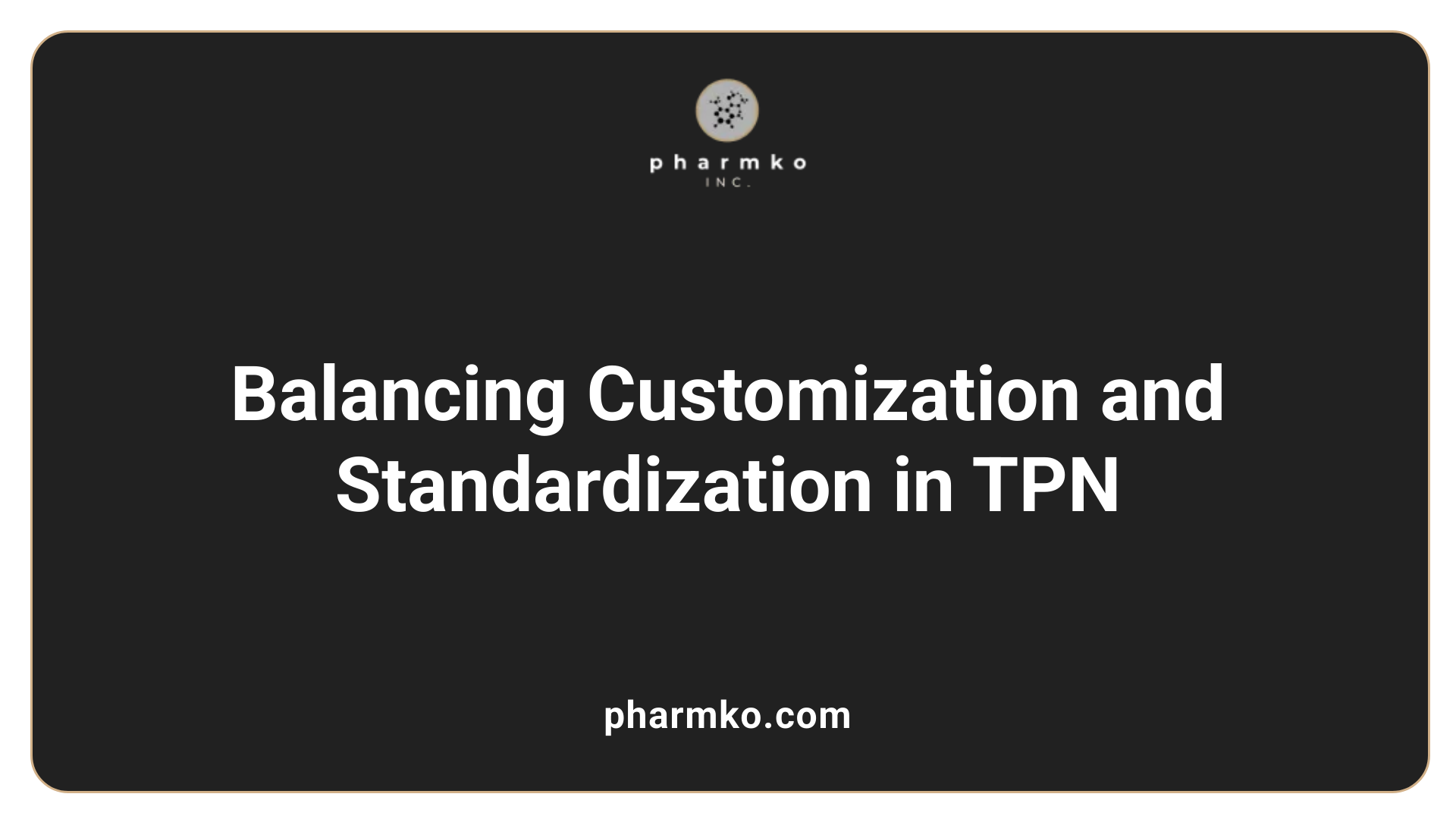
What is the role of customization versus standardization in TPN formulations?
In Total Parenteral Nutrition (TPN), the balance between customization and standardization plays a vital role in ensuring optimal patient care while maintaining efficiency in healthcare systems.
Customization involves tailoring nutrient formulations to meet the specific needs of individual patients. This approach is especially important in complex cases, such as neonates, pediatric patients, or those with unique metabolic or medical conditions. Customized TPN ensures that each patient receives precise nutrient delivery, minimizes the risk of deficiencies or toxicities, and can improve clinical outcomes.
On the other hand, standardization emphasizes creating uniform TPN solutions that can be reliably prepared and administered across various settings. Standardized solutions are designed based on evidence-based guidelines and average patient needs, which helps reduce formulation errors, streamline procurement, and simplify storage and inventory management.
Implementing standardized protocols reduces variability in practice, enhances safety by decreasing medication errors, and can lower costs through mass production methods. This approach is particularly beneficial in routine cases where patient needs are predictable.
Many institutions adopt a hybrid model that combines the strengths of both methods. They develop standardized solutions for common scenarios and reserve customized formulations for patients with complex requirements.
Ultimately, the decision to favor customization or standardization depends on multiple factors such as patient complexity, regulatory standards, resource availability, and the goals of care.
While personalized solutions enable precise and patient-centered care, standardized approaches support scalability, safety, and operational efficiency. Striking the right balance is essential for maximizing benefits for both patients and healthcare facilities.
Formulating and Implementing Personalized TPN - Strategies and Technologies
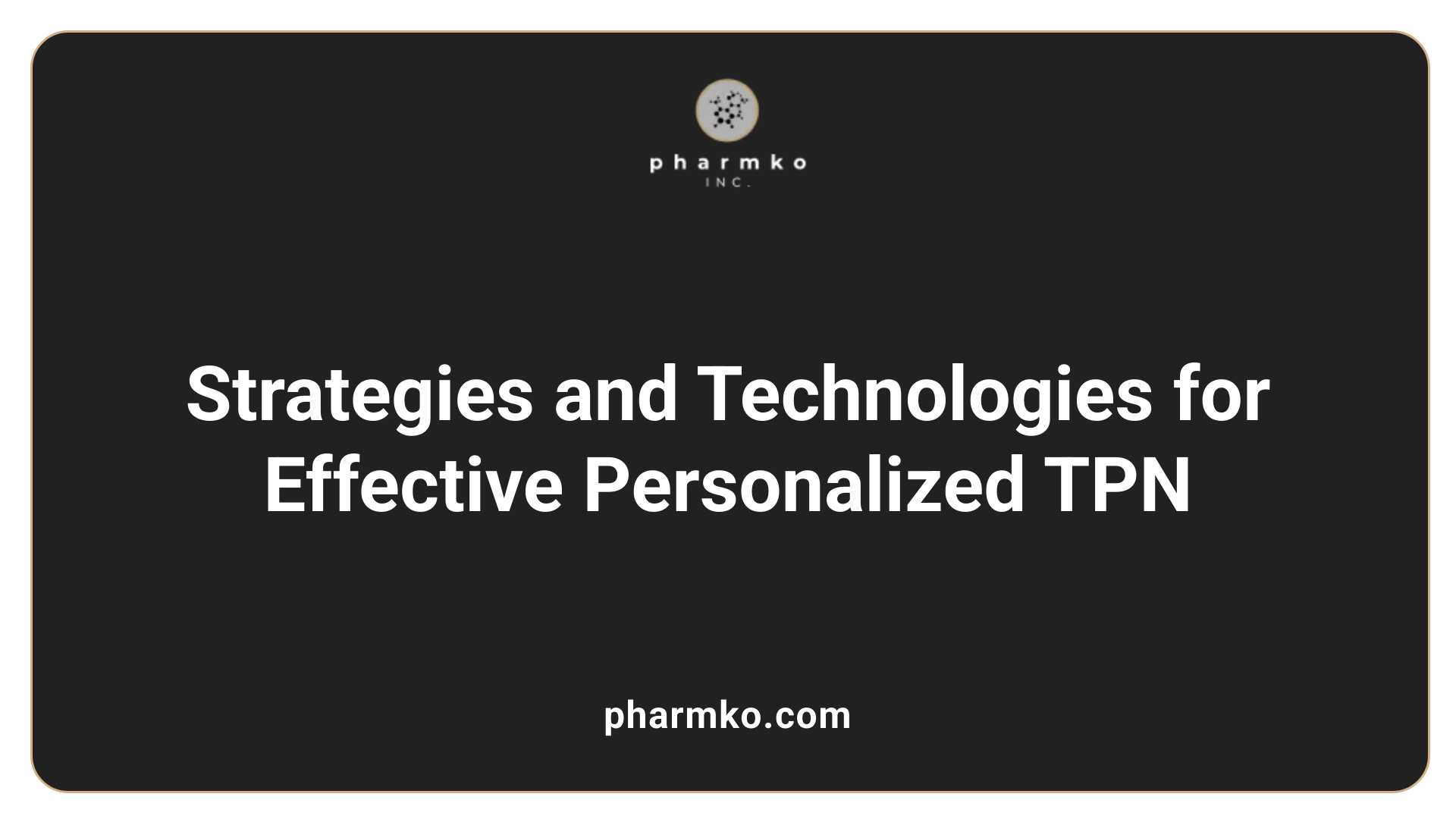
What strategies are involved in developing and implementing personalized TPN formulations?
Creating individualized total parenteral nutrition (TPN) plans requires a detailed approach that begins with thorough patient assessment. Healthcare professionals evaluate the patient’s nutritional needs through clinical examinations, laboratory tests, and analysis of medical history.
Data collection is essential in understanding unique patient factors such as age, weight, metabolic rate, organ function, and specific health conditions. This information guides the design of nutrient combinations that match the patient’s requirements, ensuring optimal growth, recovery, and health maintenance.
To enhance precision, advanced tools like artificial intelligence (AI) are employed. AI algorithms process large datasets, including electronic health records (EHR), to optimize TPN formulations by predicting metabolic responses, identifying potential risks, and standardizing preparation processes.
The integration of AI enables the development of standardized, yet customizable, TPN formulas—such as the TPN2.0 system—that have been validated to outperform traditional methods and reduce errors.
In addition to technological aids, sophisticated compounding technologies are crucial for accurate and sterile preparation. These include automated mixers and closed system compounding devices that minimize contamination and ensure consistent formulation quality.
Monitoring is ongoing; healthcare teams regularly assess patient response via laboratory tests — such as serum electrolytes, renal function markers, and metabolic profiles — adjusting the nutrient composition as necessary. This dynamic process helps avoid complications like electrolyte imbalance or metabolic disturbances.
Implementing personalized TPN solutions also involves close interdisciplinary collaboration. Pharmacists, physicians, dietitians, and nurses must work together to interpret data, make adjustments, and document protocols. Adhering to guidelines from organizations like ASPEN and ASHP ensures safety and efficacy.
Overall, the combination of patient-centric assessment, innovative technologies, and continuous monitoring forms the foundation of effective personalized TPN strategies, ultimately improving patient outcomes and safety.
Impact of Personalized TPN on Patient Recovery and Outcomes
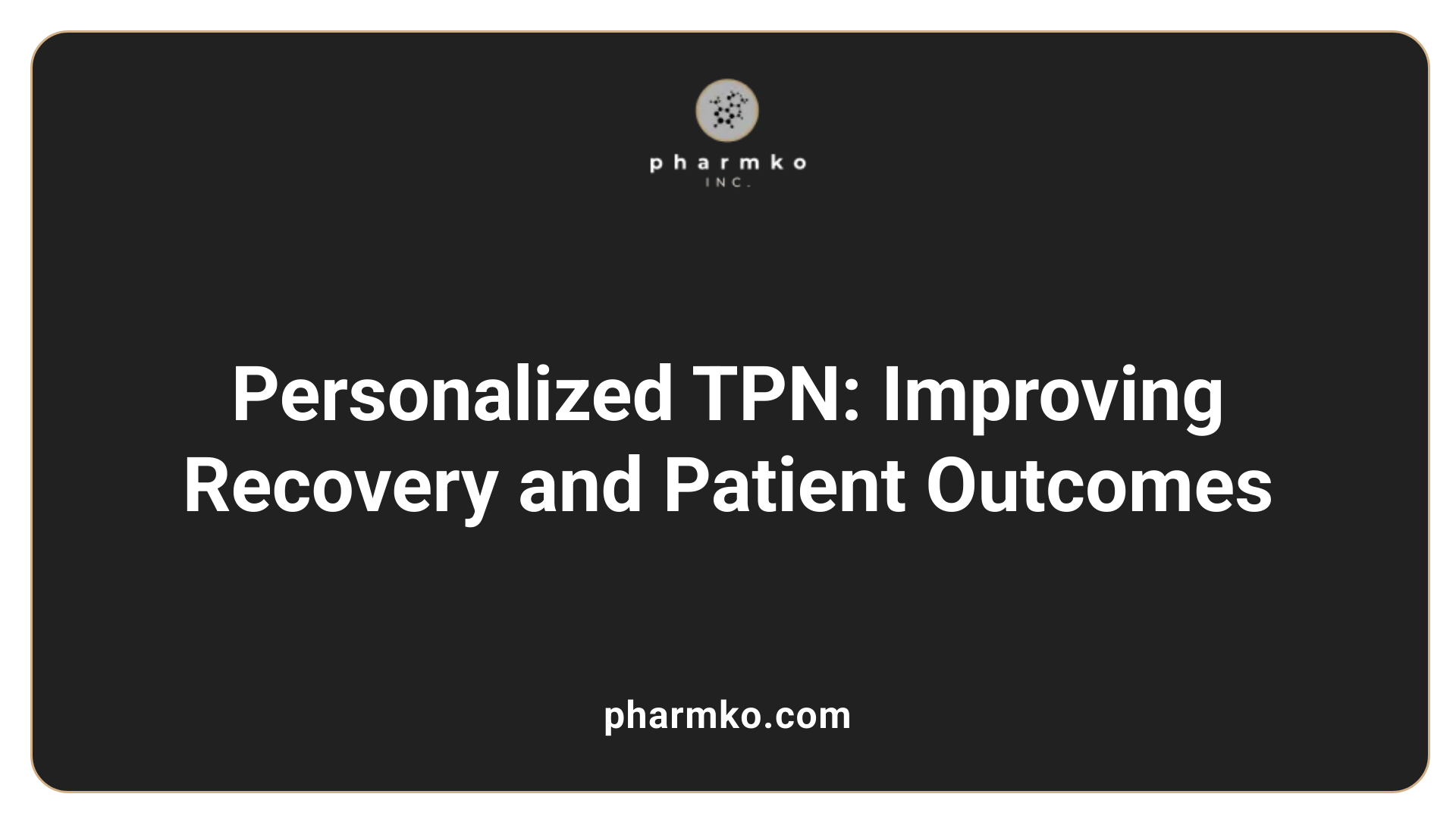
How does personalized TPN impact patient outcomes and recovery?
Personalized Total Parenteral Nutrition (TPN) significantly enhances patient health by providing tailored nutritional support that aligns with each individual’s unique metabolic and clinical needs. This customization ensures that patients receive the right balance of nutrients, electrolytes, and micronutrients, which is crucial for maintaining nutritional status and supporting recovery processes.
By adjusting components according to specific patient requirements, personalized TPN reduces common complications, including electrolyte disturbances, infections, and liver dysfunction. Properly formulated TPN can also boost immune response, promote wound healing, and stabilize fluid and electrolyte balance.
Studies show that individualized TPN contributes to shorter hospital stays and quicker functional recovery. It decreases overall morbidity and mortality, especially in vulnerable groups such as neonates, pediatric patients, and those with complex medical conditions. In sum, personalized TPN plays a vital role in promoting faster recovery, preventing adverse events, and improving long-term health outcomes for diverse patient populations.
Advances in AI and Innovative Approaches for Tailored TPN
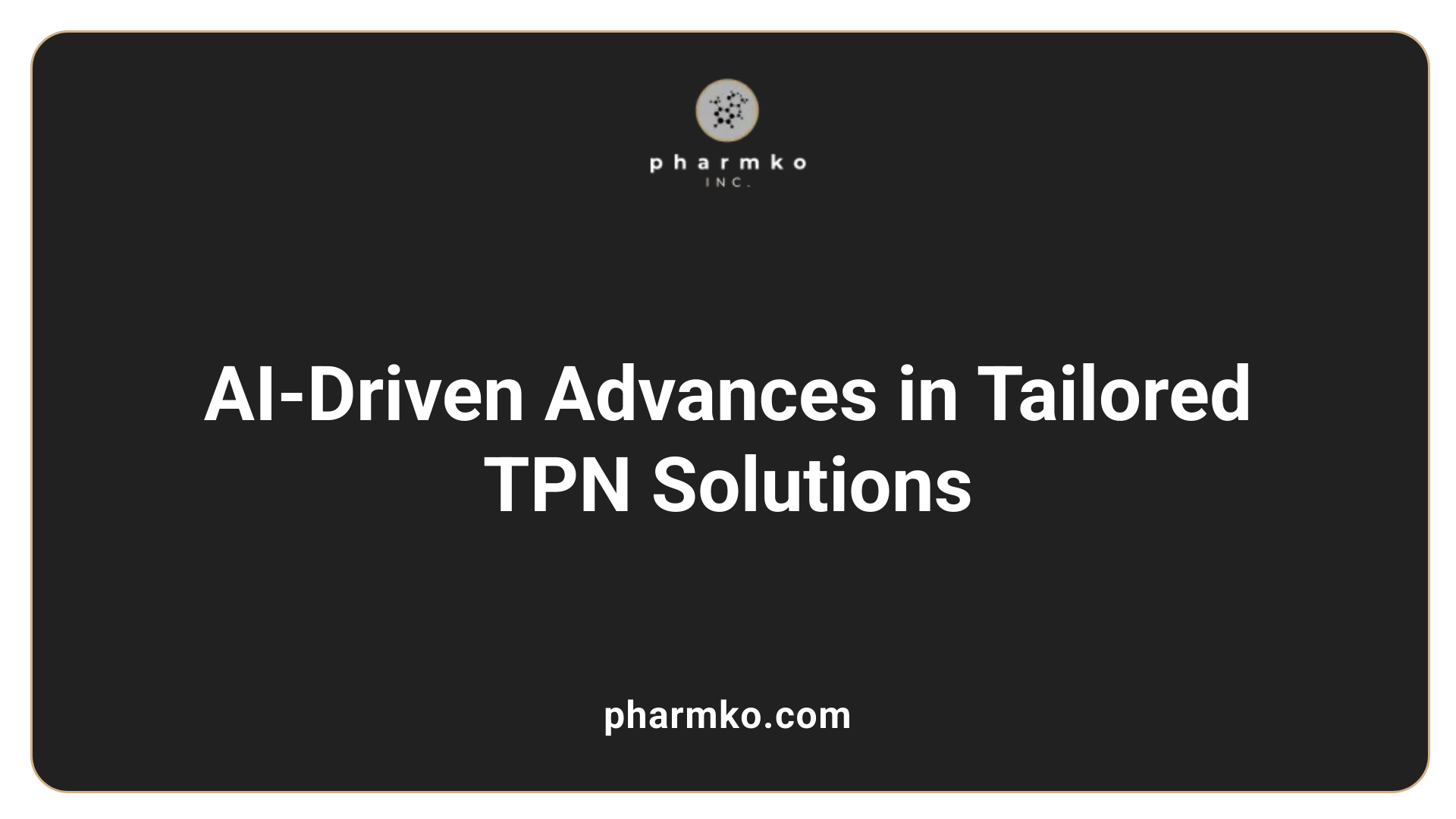 Recent developments in artificial intelligence (AI) are transforming how total parenteral nutrition (TPN) is personalized for neonatal and pediatric patients. Machine learning, deep learning, and predictive modeling form the core of these breakthroughs, enabling clinicians to design individualized nutrition plans based on comprehensive patient-specific data.
Recent developments in artificial intelligence (AI) are transforming how total parenteral nutrition (TPN) is personalized for neonatal and pediatric patients. Machine learning, deep learning, and predictive modeling form the core of these breakthroughs, enabling clinicians to design individualized nutrition plans based on comprehensive patient-specific data.
One of the most significant innovations is the implementation of AI-powered systems that can analyze vast datasets—from electronic health records (EHRs) to laboratory results—to predict metabolic responses and optimize nutrient formulations. These systems can analyze hundreds of variables to determine the ideal composition of TPN, reducing practice variability and lowering the risk of errors.
Real-time monitoring and adjustment have become more feasible with AI-driven tools. Sensors integrated into TPN delivery systems continuously collect data on patient metabolic parameters, such as blood glucose, electrolytes, and organ function. The AI algorithms interpret this data instantaneously, enabling clinicians to make prompt adjustments to the TPN composition, enhancing safety and improving clinical outcomes.
AI-powered sensors and decision support systems are also helping streamline the complex process of TPN management. These technologies assist healthcare providers by providing recommendations, reducing manual calculation errors, and ensuring adherence to safety protocols. Natural language processing (NLP) capabilities further support clinicians by simplifying documentation, facilitating communication, and updating patient records efficiently.
The overall goal of these innovative AI-guided approaches is to advance personalized nutrition therapy. By tailoring TPN according to real-time patient needs, these technologies help prevent complications like electrolyte imbalances, metabolic disturbances, and infections. Additionally, they support safer, more consistent preparation of TPN solutions, which benefits both patient safety and healthcare resource management.
As research continues, broader application of these AI strategies promises to improve neonatal and pediatric care significantly, especially in resource-limited settings where precision and safety are crucial. The integration of AI with clinical expertise marks a new era in individualized nutrition therapy—making TPN safer, smarter, and more effective than ever before.
Personalized TPN in Neonatal and Pediatric Care
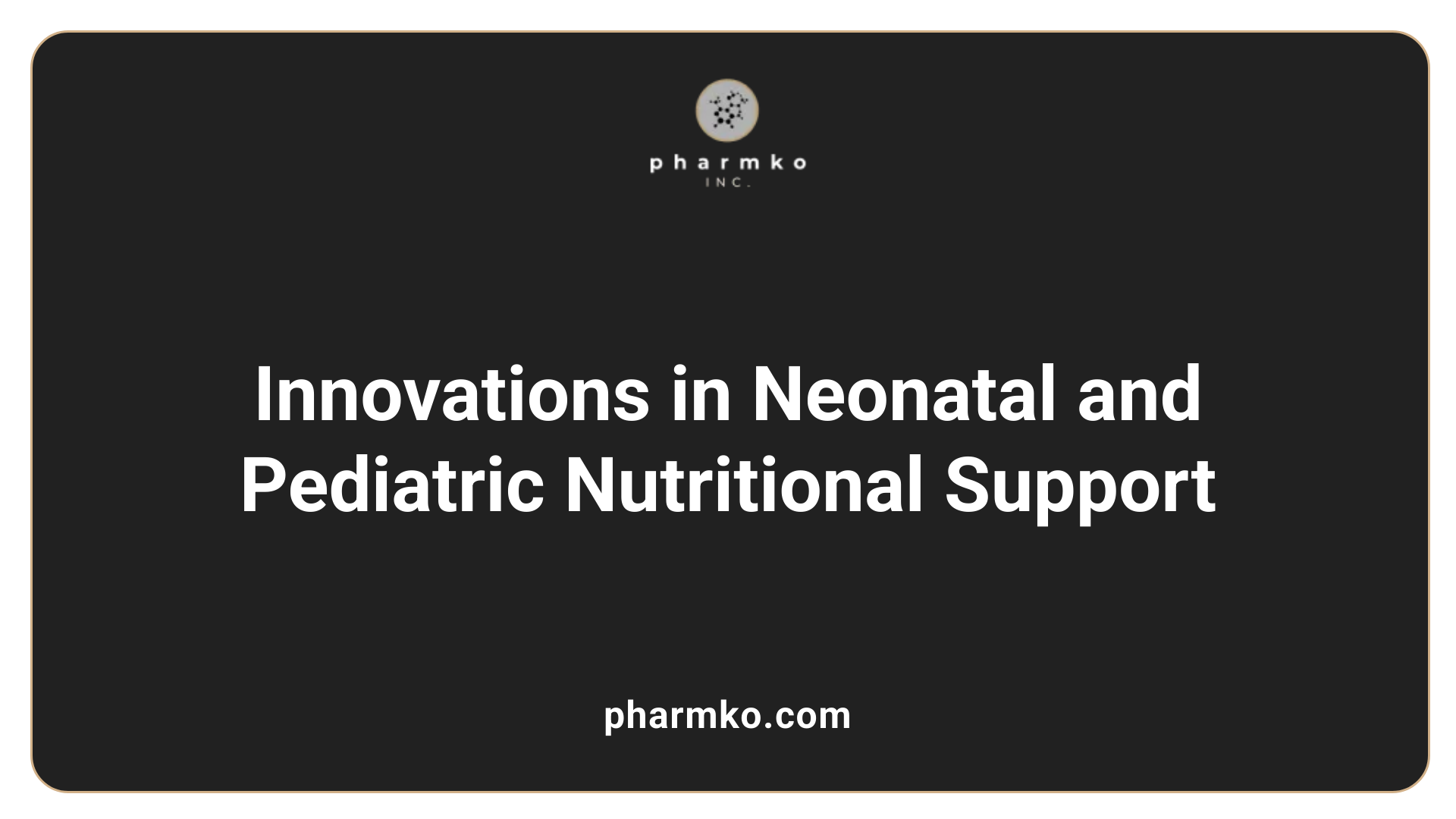
How is personalized TPN applied in neonatal and pediatric care, especially in NICU and treatment of preterm infants?
Personalized Total Parenteral Nutrition (TPN) plays a vital role in neonatal and pediatric healthcare, especially within Neonatal Intensive Care Units (NICUs) where the nutritional needs of preterm and ill infants are highly specific. This approach involves customizing nutrient formulations to meet the individual metabolic and developmental requirements of each patient.
In NICUs, clinicians assess various factors including gestational age, birth weight, clinical conditions, and laboratory data to tailor TPN solutions. Adjustments often include macronutrients such as glucose, amino acids, and lipids, along with micronutrients like electrolytes, vitamins, and minerals.
This precise customization ensures that the rapid growth and organ development of neonates are supported and risks such as metabolic imbalances, infections, or nutrient deficiencies are minimized. For preterm infants, who are especially vulnerable, personalized TPN helps optimize weight gain, support lung and brain development, and reduce complications.
Advanced data analysis tools and AI-driven algorithms contribute to accuracy in formulation. These technologies analyze large datasets, including routine Electronic Health Record (EHR) data, to generate specific prescriptions, reducing human errors.
In managing complex conditions such as necrotizing enterocolitis or low birth weight, tailored TPN strategies are essential for balancing nutritional benefit with safety, thereby improving survival rates and long-term outcomes. Overall, personalized TPN in neonates advances the quality of care, promoting healthier development and resilience for the most vulnerable patients.
The Application of AI and Data-Driven Technologies in TPN Optimization
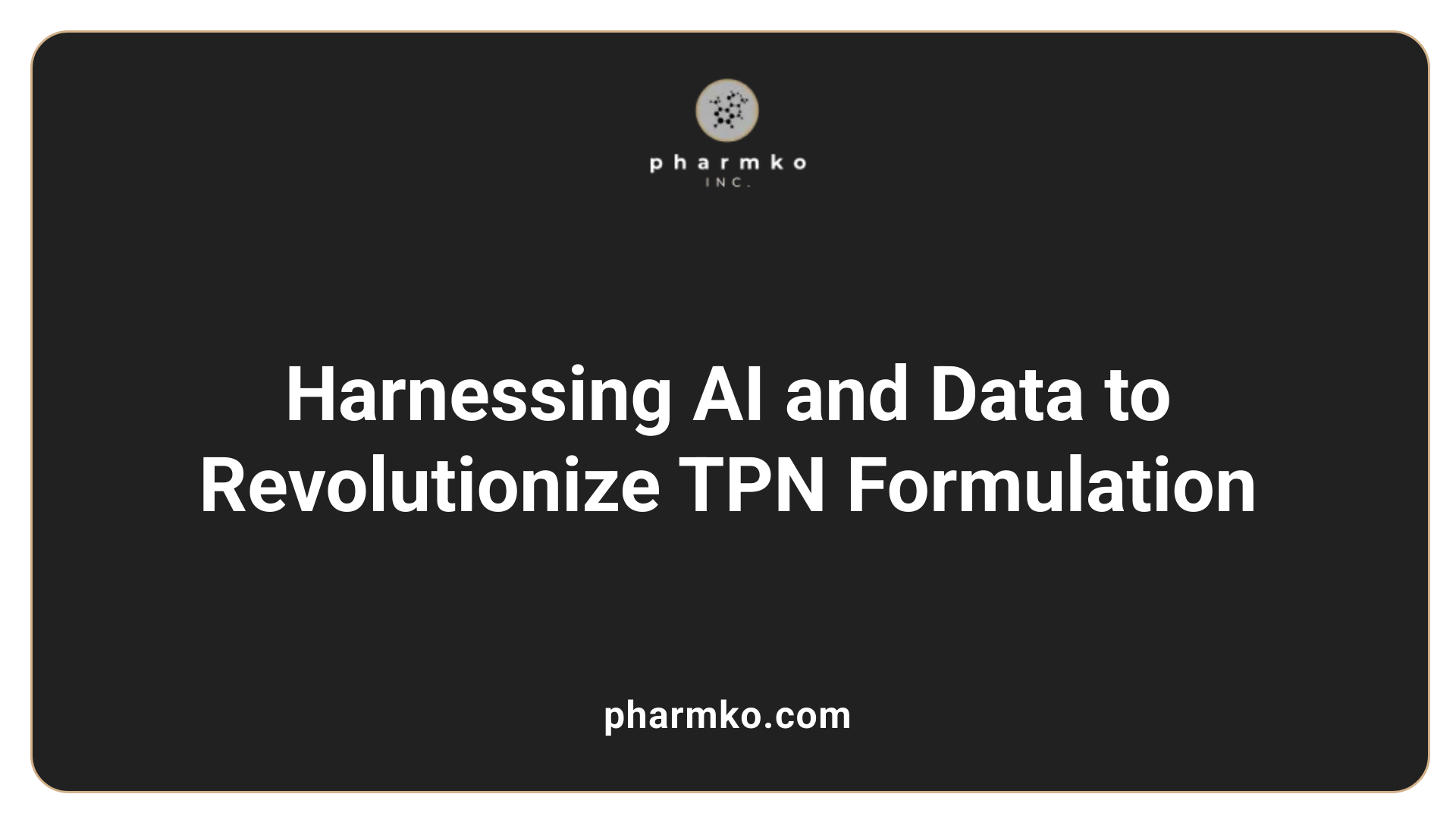
How does data collection from electronic health records (EHRs) support TPN standardization?
Data collection from EHRs provides comprehensive patient information, including clinical history, lab results, and nutritional assessments. This wealth of data enables healthcare teams to develop more precise, individualized TPN formulations. By analyzing large datasets, AI algorithms can identify patterns and predictors for nutritional needs, reducing variability and enhancing safety.
How do formulating consistent yet flexible TPN solutions benefit neonatal and pediatric care?
Using data-driven methods, hospitals can develop standardized TPN formulations that are adaptable to individual patient variations. Approaches like TPN2.0 utilize machine learning to create a core set of formulas that serve most patients while allowing tailored adjustments. This balance improves accuracy, reduces errors, and ensures that neonatal and pediatric patients receive appropriate nutrients based on their specific needs.
How does supporting clinical decision-making with AI improve patient outcomes?
AI tools assist clinicians by providing evidence-based recommendations for TPN prescriptions, flagging potential incompatibilities or risks. For example, AI models trained on decades of prescription data can predict optimal formulations, minimizing complications such as metabolic imbalances or infections. Incorporating AI in decision-making supports safer, quicker, and more effective therapy management.
What is the impact of AI-driven TPN optimization on conditions like short bowel syndrome or kidney disease?
Personalized TPN solutions significantly enhance treatment in certain conditions. In short bowel syndrome, AI helps tailor nutrition to compensate for reduced intestinal absorption, ensuring adequate nutrient delivery. For kidney disease, TPN formulations can be adjusted to limit waste-associated nutrients like phosphorus and potassium. As a result, patients experience improved recovery, reduced complications, and better overall outcomes.
How do innovative AI techniques like deep learning and transformer architecture contribute?
Deep learning models, including transformer architectures, analyze vast amounts of EHR data to generate accurate, personalized TPN recommendations. These technologies help identify subtle patient-specific differences and improve the safety and efficacy of nutrition therapy. Moreover, AI frameworks like physician-in-the-loop ensure that clinical judgment guides automated recommendations, maintaining safety standards.
| Aspect | Impact | Details |
|---|---|---|
| Data Collection | Foundation for personalization | EHR data supports precise formulation development |
| Standardization | Decreases errors | AI-driven formulas reduce prescription variability |
| Clinical Decisions | Enhances safety and efficacy | AI alerts and recommendations aid clinicians |
| Personalized Treatment | Better outcomes | Tailors TPN in diseases like kidney failure and short bowel syndrome |
| Technologies Used | Improve accuracy | Deep learning, transformers, and AI models |
This integration of data, AI, and clinical expertise advances neonatal and pediatric TPN therapy, leading to safer, more effective, and individualized nutritional support.
Evidence and Scientific Support for Personalized TPN
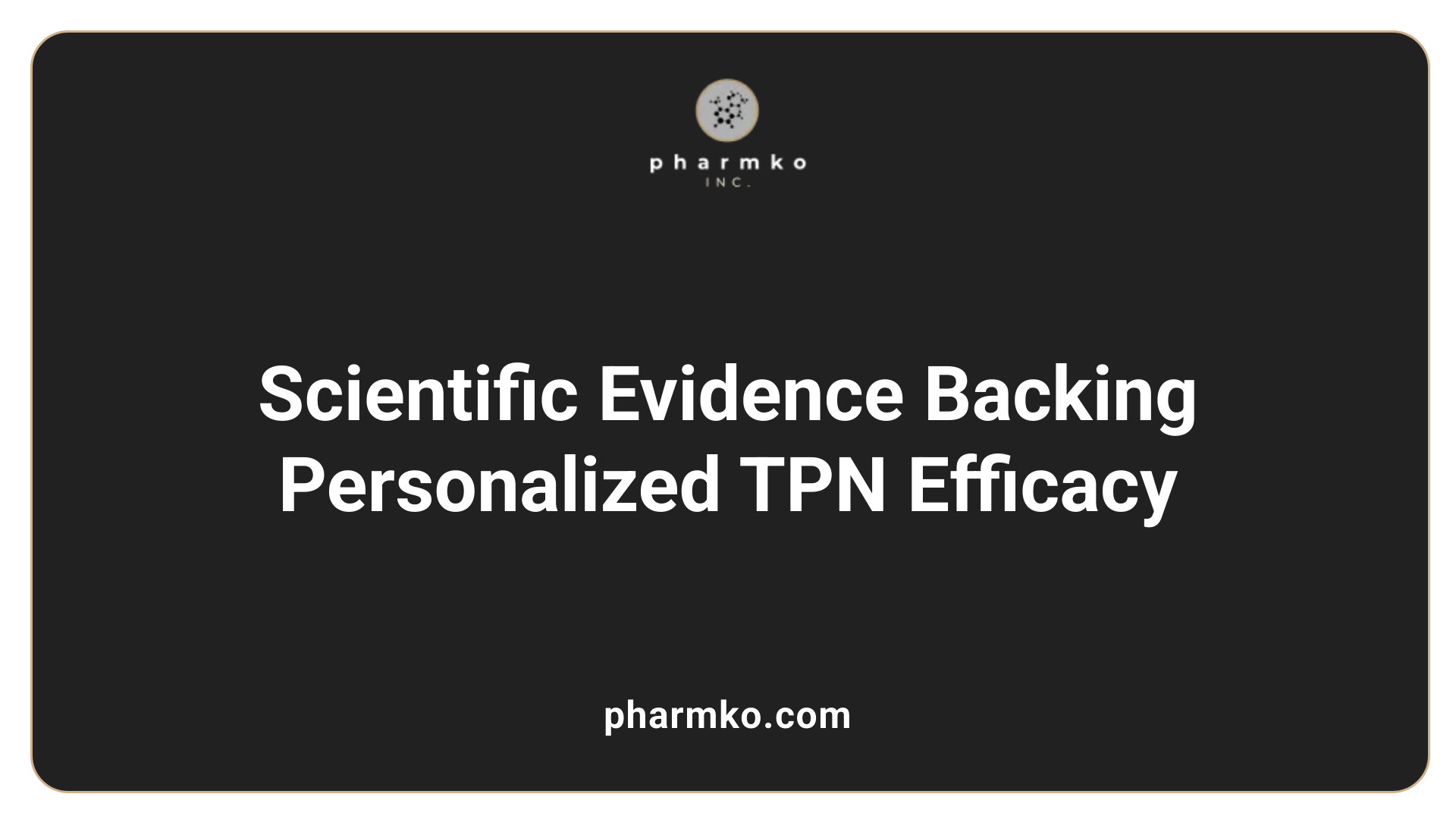 Recent research and clinical trials have demonstrated the potential benefits of personalized total parenteral nutrition (TPN) in improving patient outcomes. Studies show that tailoring TPN formulations to individual nutritional needs can significantly reduce complications, enhance safety, and optimize nutrient delivery. Although the field is still developing, emerging evidence suggests that personalized approaches contribute to better clinical efficacy.
Recent research and clinical trials have demonstrated the potential benefits of personalized total parenteral nutrition (TPN) in improving patient outcomes. Studies show that tailoring TPN formulations to individual nutritional needs can significantly reduce complications, enhance safety, and optimize nutrient delivery. Although the field is still developing, emerging evidence suggests that personalized approaches contribute to better clinical efficacy.
One major advancement is the utilization of data-driven methods, including artificial intelligence (AI), to formulate customized TPN solutions. For example, the development of TPN2.0, an AI-based system trained on extensive prescription data, has shown strong correlation with expert recommendations (Pearson’s R=0.94) and superior accuracy over traditional models. It uses deep learning techniques, such as variational neural networks, to generate standardized yet individualized formulas, which reduces human error and practice variability.
Clinical validation of these models indicates that personalized TPN prescriptions decrease practice deviations associated with higher risks of neonatal morbidities, including necrotizing enterocolitis and sepsis. Further, the implementation of AI-driven solutions could be particularly beneficial in resource-limited settings by increasing access to safe and effective nutrition therapies.
Additionally, personalized approaches extend beyond AI technology. Genetic and molecular markers are increasingly used to customize nutritional interventions, addressing individual metabolic responses. This tailored strategy aims to prevent malnutrition and promote recovery, especially in vulnerable populations such as neonates, children, and patients with chronic illnesses.
Data from real-world implementations reinforce the importance of standardized practices. For instance, transitioning from paper-based to electronic TPN orders has notably decreased errors from 22% to 3.2%, reducing risk and improving safety. Guaranteeing correct nutrient compositions aligned with patient-specific needs is vital, especially in cases involving kidney or metabolic impairments.
In conclusion, current scientific evidence supports the trend toward personalized TPN, emphasizing reduced complications, enhanced safety, and improved outcomes. Continued research, including larger clinical trials focused on personalization in nutrition therapy, will further solidify this approach’s role in clinical practice.
Challenges, Barriers, and Future Directions in Developing Personalized TPN
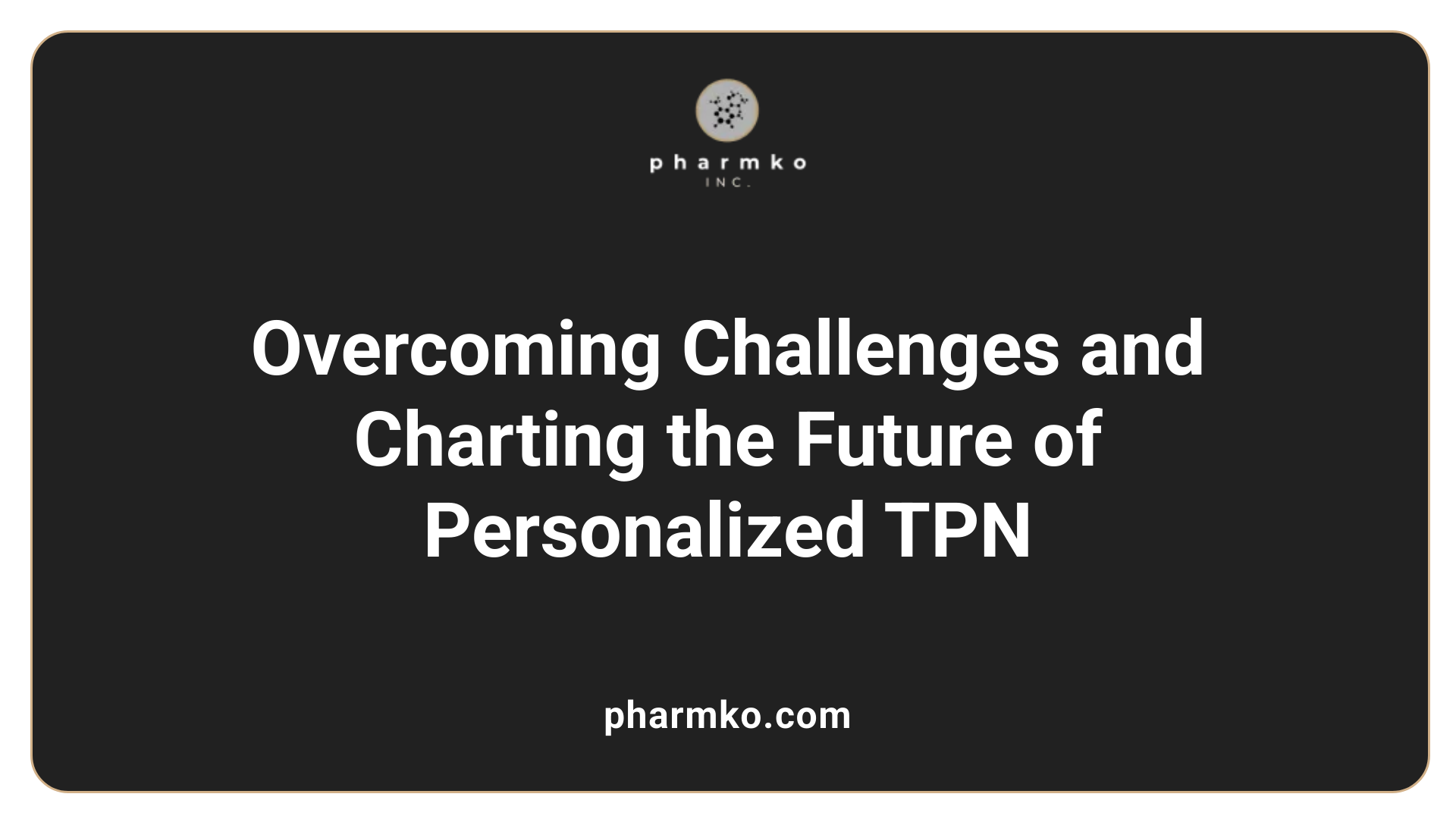
What are the challenges, barriers, and future directions in the development of personalized TPN?
Developing personalized Total Parenteral Nutrition (TPN) faces several hurdles. One major challenge is the high cost of advanced technologies necessary for individual customization. Integrating precise nutrient formulations tailored to each patient requires sophisticated equipment and specialized skilled personnel.
Technological complexity stands as another barrier. Designing polymer–drug conjugates with exact drug release profiles, ensuring consistent physico-chemical properties, and developing scalable manufacturing processes pose significant obstacles. These processes demand extensive research and validation before clinical implementation.
Regulatory and validation challenges further complicate advancement. The need for rigorous clinical trials to demonstrate safety, efficacy, and consistency delays approval processes. Additionally, existing regulations often limit the rapid adoption of innovative formulations and delivery systems.
Looking ahead, several promising directions aim to overcome these barriers. The integration of artificial intelligence (AI) and machine learning into formulation development can significantly optimize nutrient mixtures based on large datasets, predicting individual responses more accurately. AI-driven approaches aid in designing well-defined polymer architectures and personalized formulations.
Emerging research in nanomedicine and polymer therapeutics offers potential solutions. Well-characterized polymer–drug conjugates that ensure controlled release and targeted delivery may revolutionize TPN safety and effectiveness. These nanotechnologies can facilitate the development of modular, customizable solutions adaptable to patient-specific needs.
Expanding the clinical evidence base through robust trials is crucial. It will validate personalized TPN approaches, encourage regulatory approval, and foster practitioner confidence. Collaborative efforts among researchers, clinicians, and regulatory bodies are essential.
In summary, addressing the high costs, technical complexity, and regulatory barriers through innovative research and technological progress, particularly AI and nanotech, will be vital. These advancements promise to make personalized TPN a practical reality, enhancing patient outcomes and safety in the future.
Harnessing Innovation for Better Patient Outcomes
The integration of personalization strategies, advanced technologies like AI, and interdisciplinary collaboration marks a significant evolution in TPN practice. By customizing formulations to individual needs, healthcare providers can improve safety, efficacy, and patient outcomes while reducing errors and complications. The ongoing development of scientific evidence, coupled with technological advances, promises a future where tailored nutritional therapies are standard in both critical and chronic care settings, ultimately enhancing recovery and quality of life.
References
- Total Parenteral Nutrition Standardization and Electronic Ordering to ...
- Role of pharmacists in providing parenteral nutrition support
- The Modern Approach to Total Parenteral Nutrition - MDPI
- (PDF) Total Parenteral Nutrition Standardization and Electronic ...
- AI-guided precision parenteral nutrition for neonatal intensive care ...
- The Role of Artificial Intelligence in Personalized Nutrition
- Role of the pharmacist in parenteral nutrition therapy
- Optimizing Health Results with Personalized Lifestyle Medicine
- [PDF] Total Parenteral Nutrition in Patients with Kidney Disease
- Nutritional Care For Healthcare Professionals - Baxter













